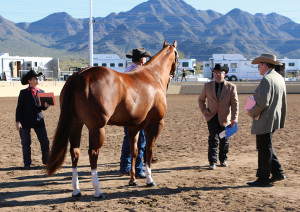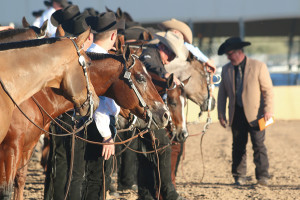Judges Recertification Rundown
Click here to read the complete article
AQHA Judges Are Going Back to School! We talked to a few judges to get their thoughts on the recertification program.
by Kristen Spinning
 It was a déjà vu experience of “back to school” for all-around judges when AQHA’s new Judges’ Recertification requirement was announced in 2014. After many years spent in the chair, one critical final could now greatly impact their careers. No matter how well they knew the rulebook, or how much confidence they had in their skills, the mere notion of being retested brought a good deal of speculation and anxiety to cardholders.
It was a déjà vu experience of “back to school” for all-around judges when AQHA’s new Judges’ Recertification requirement was announced in 2014. After many years spent in the chair, one critical final could now greatly impact their careers. No matter how well they knew the rulebook, or how much confidence they had in their skills, the mere notion of being retested brought a good deal of speculation and anxiety to cardholders.
The first recertification exam in AQHA history was administered in December 2014 at the conclusion of the AQHA Judges’ Conference in Dallas. It took a score of 80 percent or higher to pass the AQHA rulebook test and a score of 75 percent or higher to pass the video tests in Trail, Western Riding, Reining, and Horsemanship.
The Judges’ Committee has been discussing recertification since 2013, and it’s a topic that comes up frequently during talks with members, trainers, and exhibitors. The action wasn’t based on some punitive agenda, rather the goal, first and foremost, was to emphasize greater education as a means of making judging more accurate. Any judge who didn’t pass the exam had the opportunity to retake it January 8-10, 2015, at the Educational Judging Seminar in Nashville, TN.
The December conference started off with 10 judges being awarded 20-year pins for their dedicated service to AQHA. Honorees were Milt Alderman, Steve Brown, Kenny Hall, Rebecca Halvorson, Nancy Sue Ryan, Lee Ann Harrison, Lisa Krohn, Jeffrey Pait, Kenda Pipkin, and Howard Rea. All ceremony aside, everyone knew the main focus of the conference. Most judges had been studying and conferring with each other for months in preparation for the exam. Some had even set up study groups.
Once judges arrived at the conference, they soaked up even more information in the myriad of educational seminars presented by industry leaders like Jackie Krshka, Terry Thompson, Stephanie Lynn, Carla Wennberg, Leslie Lange, Michael Colvin, Charlie Cole, Leonard Berryhill, and Jody Brainard. Seminar topics included examining the finer points of Horsemanship, Hunt Seat Equitation, Western Riding, Trail and Reining.
The merits and long-term outcome of the recertification will undoubtedly be discussed around the rails for many months to come. However, those who actually went through the process have the best insight on how it will benefit judges, exhibitors, and the industry as a whole.
“I think it’s a really positive thing for judges,” Lisa Ligon says. “We all do our continuing education seminars, but now we have an incentive to really focus on them and get more out of them.” She believes judges have a great deal of responsibility when it comes to steering the direction of the industry. Along with that responsibility comes the need to be well educated, current, and mindful. “I don’t believe they really want to take anyone’s card away. That’s not the point. Recertification makes continuing education more meaningful. As judges, we are credited with knowing everything about a class. This just makes it certain we really do know what we’re doing.”
She also sees another benefit to the process. “Exhibitors are [moving for] added accountability. That’s a theme we have been seeing for quite a while.” She views recertification as a service to exhibitors and something that will benefit horse showing in the future.
Leslie Lange was very busy at the Judges’ Conference. She receive her pin for 20 years of service as a judge, was a presenter for the Trail seminar, and took her place alongside the other judges to take the tests. “To be frank, when recertification was first announced, I was against it,” she says. Having a long career as a highly successful trainer and respected judge, she was confident in her knowledge and ability to judge. However, she grew to understand the reasoning behind the move. “After all, we are tested every day that we go into that ring to judge. Why shouldn’t we be able to take an exam?”
She acknowledges that judges may have had to take continuing education seminars in the past, but there was never any real consequence if someone failed the test given at the end of the class. Now, she feels there will be more accountability for staying current, and it will encourage people to be more serious about learning new rules.
Lange believes AQHA’s objectives were met well before testing began. “Most everybody put a lot of effort into studying and were up to date before they walked into the conference.” The presenters who led seminars knew that too and focused more on how a particular class was going to be tested rather than the rules of that class. They reviewed testing scenarios and explained what to expect so everyone understood the process.
“The testing itself was straightforward, with no surprises,” she says. “The rules section was directly out of the rulebook. There was really no excuse for not passing it—other than a lack of interest or real knowledge.”
Lange believes the real winners will be the exhibitors who now can have greater confidence that the person marking them is accountable, not lackadaisical, and has a thorough understanding of the latest trends. “We aren’t all going to see a class the same way,” she remarks. “But, all judges should be able to pick out the top level performers in a class, find the middle of the group, and recognize the lowest level.” She adds that another benefit might be show managers having greater confidence in hiring judges outside their core group.
Like Lange, Leonard Berryhill experienced the conference from both sides of the room. “Charlie Cole and I presented the Western Riding seminar. We decided that the judges knew the rules, so we told them we weren’t going to waste time going over them.” Instead, the pair got right down to the business of judging. They showed videos and penalty clips, discussed what to look for, how moves were scored, and what types of things to expect from the video testing portion of the exam. “I had the opportunity to see [continuing education] in a different light. I saw peoples’ reactions when they were involved in the class.” Berryhill felt the audience was fully invested in getting as much as they could from his presentation, as well as the other seminars. The actual process for video testing required watching videos of eight runs of each class. Judges then had to score each run within a set time, in order to pass.
Berryhill has always enjoyed the judges’ workshops he has attended over the years and feels the recertification process has helped him a lot. “It opened my eyes to things I may have been weak in. It got me back in shape.”
He admits being opposed to the notion of recertification when it was first announced. Getting over that part of denying one’s own ego was difficult for many of the judges. He, like others, knew how much time and effort they put into getting their cards in the first place, and they didn’t want to have to go through it all over again. However, the overall benefit to the judges and exhibitors won him over.
 He is certain judges will now do a better job of staying current. In a sport where everyone is constantly trying to better himself or herself, judges now have that need as well.
He is certain judges will now do a better job of staying current. In a sport where everyone is constantly trying to better himself or herself, judges now have that need as well.
“Most judges I’ve known pride themselves on being a judge,” he says. “Testing and recertification brought that pride out again. I talked to many folks afterward, and they were all proud to get through it. Even those who scored poorly on a section were more determined than ever to learn it better and test again.”
Jill Newcomb likes the fact that judges are now required to go through a recertification process. Just like when she is in the ring herself, she wants to know the person judging her is up to date on rules and scoring.
“Exhibitors pay for someone else’s opinion,” she says. “It’s reasonable to assume that they are current, well educated, and have been paying attention to the changes that have been going on in the industry.” She reasons that the caliber of horses and riders keeps improving year after year. It’s only natural that the quality of judges keeps getting better to keep pace. She insists, “We all need to stay at the top of our game.”
She adds that with the changes in rules, score sheets, and patterns, it’s important to be sure everyone is on the same page when scoring a class. She agrees with all the judges that by its very nature, the process is subjective. Still, there should be a sense of continuity to the process. Recertification should be a step in the right direction.
Newcomb believes one big benefit for exhibitors has already happened. “They all have heard about recertification and that judging should be more standardized because of it. Now, we can see the score sheets. We can see on paper what was marked and why, and [someone] can know for sure it wasn’t because the judge didn’t like of the color of her jacket!”
Newcomb went through the continuing education and testing herself, sitting right next to folks who might be judging her someday. She adds, “I might not like their opinion, but now I’ll know how they came to it.”










